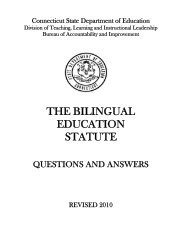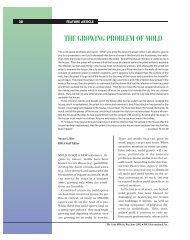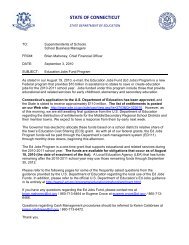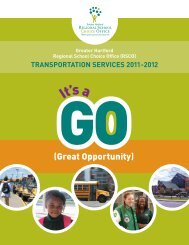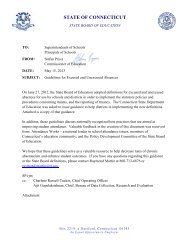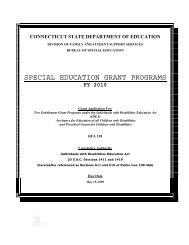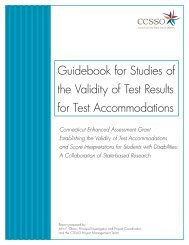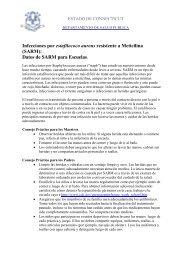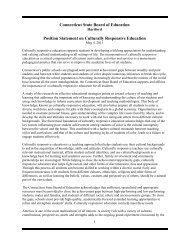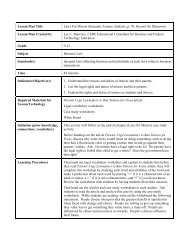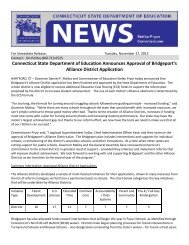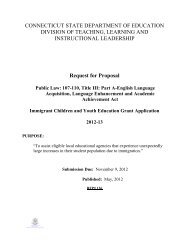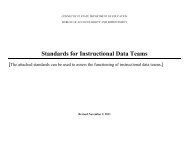Early Childhood - Connecticut State Department of Education
Early Childhood - Connecticut State Department of Education
Early Childhood - Connecticut State Department of Education
Create successful ePaper yourself
Turn your PDF publications into a flip-book with our unique Google optimized e-Paper software.
Assessment Chapter 4<br />
HELPFUL TERMS<br />
Assessment An in-depth look at how a child is developing. It may be specific<br />
to one area <strong>of</strong> development or to the whole child. Assessment uses<br />
both formal and informal tools for gathering information on an<br />
ongoing basis.<br />
Disability An inability to perform a function, preventing or making it difficult<br />
for an individual to engage in activities.<br />
Evaluation Use <strong>of</strong> formal and informal tools to gather and interpret information<br />
in order to determine a child’s strengths and weaknesses.<br />
Information gathered over time allows for development <strong>of</strong> a process<br />
to effect improvement and change in the child’s environment.<br />
Formal Assessment A process using standardized assessment tools, reported validity<br />
and reliability, and <strong>of</strong>ten with more structured formats and<br />
requiring training for administration.<br />
Individualized <strong>Education</strong> A plan detailing educational goals and services based on the child’s<br />
Program (IEP) needs. It is developed at a Planning and Placement Team (PPT)<br />
meeting, with the participation <strong>of</strong> parents/family, teachers and<br />
appropriate specialists.<br />
Individuals with Disabilities The federal law that provides requirements for the provision <strong>of</strong><br />
<strong>Education</strong> Act (IDEA) special education services to students, ages 3-21.<br />
Informal Assessment A process that looks at the child within his or her daily experiences<br />
and activities with minimal interference in the child’s day. It<br />
<strong>of</strong>ten includes such tasks as observation and recording, review <strong>of</strong><br />
portfolios, etc.<br />
Planning and Placement A group <strong>of</strong> certified and/or licensed pr<strong>of</strong>essionals representing each<br />
Team (PPT) <strong>of</strong> the teaching, administrative and pupil personnel staffs, all<br />
participating equally with the family in the decision-making<br />
process to determine specific educational needs and develop an<br />
Individualized <strong>Education</strong> Program (IEP) for a child.<br />
Reliability The degree to which scores on tests are consistent, dependable and<br />
able to be replicated. “Does it yield the same type <strong>of</strong> results each<br />
time?”<br />
Screening A brief look at how a child is developing to determine if a more<br />
detailed evaluation is necessary. It cannot be used to diagnose,<br />
treat, place or deny a child’s access to a program or service.<br />
Testing A process <strong>of</strong> sampling behavior or knowledge at specific points in<br />
time to determine levels <strong>of</strong> change or growth. Testing is generally<br />
associated with measuring achievement or growth in intelligence or<br />
ability.<br />
Validity The degree to which a test measures what it is intended to measure.<br />
“How truthful is the test? Does it test what it says?”<br />
46



